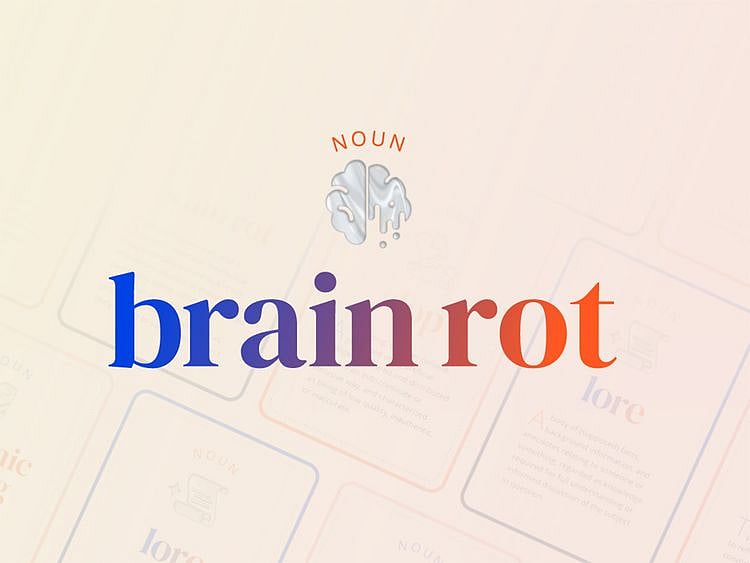What’s in a word? Plenty, if it is a metaphor for an overwhelming trend across 365 days. The ‘Rizz’ of 2024, a charming, positive slang and short for charisma — usually romantic, has got a rude awakening.
We are counting down to new beginnings with ‘Brain rot’, Oxford word of the year defined as ‘the supposed deterioration of a person’s mental or intellectual state, especially viewed as the result of overconsumption of material (now particularly online content) considered to be trivial or unchallenging.’
In a world seeped ankle deep in the virtual, all those habitual doom scrollers and mindless reels consumers easily fall within the definition. Every like or share, uploaded or silently stalked, triggers emotions ranging from excitement, adrenalin to competitiveness. In this digital compulsive disorder, the ability to engage in profound and meaningful experiences is quietly disappearing.
‘If there is constant exposure to continuous information and active interface where the interaction is with that information which is not important or meaningful when a person scrolls, swipes or searches, then multiple impacts happen,’ says psychiatrist Dr Samir Parikh.
‘Whether it is mental fatigue because the brain is not getting a rest, impact of factually incorrect information or the impact on physical life and social engagement because you aren’t there when you are there it will cause its own level of dullness whether at cognitive, social or physically fatigued level.’
Also Read
Rafael Nadal: Farewell to tennis' ultimate warriorAustralia takes on Big Tech to safeguard kids’ futuresHow everyday plastics slowly destroy our healthDelhi's toxic air: Farm-fire fixation is a dangerous distractionFrivolous online content
This year’s choice of word is different for a big reason. Unlike ‘selfie’ in 2013 or ‘vax’ in 2021, ‘brain rot’ isn’t a word chosen for its popular online usage.
Instead, it refers to behavioural patterns resulting from a dopamine like kick and smartphone addiction and flags the resulting overstimulation that impacts cognitive functions. Recent research points to prolonged internet usage leaving a negative impact on attention and short-term memory.
Words like demure, dynamic pricing, romantasy were in contention and shortlisted. Their origin — as in contemporary vocabularies — is from Generation Z and Gen Alpha dictionaries. ‘Brain rot’ on the other hand has a far more vintage antecedent.
The term was first used as far back as 1854 when Henry David Thoreau penned it in his book ‘Walden,’ where he bemoans about the degeneration of ideas and intellectualism and the deeper reflection on society and its emerging vacuousness.
The choice of the winning word this year is encouraging. It emphasises the importance of stonewalling the digital march, at least in its absolute avatar. Brain rot is like a centre where multiple roads converge whether it is addiction, sleep deprivation or reduced attention span. They are all enabled by frivolous online content. As per BBC, there was a 230% increase in its usage from 2023 to 2024.
Wider canvas of interpretation
So, are there any rules of engagement? There is always a choice although the young may disagree. Separating the cord between the self and the phone begins with an admission of a comfort zone that is uncomfortable. Silencing notifications is a good place to start nor is digital detox just casually flung jargon.
FOMO, or the fear of missing out is part of the internet game and those who have understood it are leading the pushback. The hearty news this year was the realisation that while digital overload may be inescapable, it is not unavoidable.
The sight of some gadget free zones at parks and restaurants is welcoming. Small as it may be at the moment, but there is a movement to reclaim. Technology, apart from its benefits, is primarily a toy. And as any other marketing ploy, it was there to entice us. And we fell for it, hook, line and sinker. There was no differentiating the good from the beneficial. What happens when we don’t pause the digital footprint and the rot sets in deeper?
There is unlikely to be any reversal in global internet usage in the foreseen future — 95% of US adults use the internet now as compared to 52% in 2000.
DataReportal — the digital reference library, estimates the current number to be more than 5.3 billion. It also says that worldwide users spend nearly 7 hours daily online estimating that from 18 a person who lives to be 80 would have spent more than 17 years of their adult life online!
Look at where we are. You may think you are watching a new version of Star Trek when you hear slangs like skibidi — not good, fanum tax — stealing food, sigma — cool. This though is classic Gen Alpha vocabulary, alien and degenerative and yet as widely used as though this is their mother tongue.
In historical context words define cultural movements and change. They are also a sign of times in transition. Importantly, they signify collective familiarity, mood and communication.
‘Brain rot,’ even unwittingly falls into a wider canvas of interpretation. After a year of immeasurable loss in Gaza where more children have been killed than in four years of global conflict, it is hard to overlook humanity’s collective abdication.
Oxford word of the year sums up it for the rot is also about the silence when ceasefire after ceasefire in Gaza was vetoed, led by America while Israel continued its offensive, bombarding refugee camps and hospitals and wiping out generations.
Perhaps this is what Thoreau meant, when he spoke of societies existing in a moral vacuum. This year we have not set the best examples of ourselves, online and offline. In the words of Shakespeare, there is something rotten in the state of Denmark. Will we find our way back in 2025?
Network Links
GN StoreDownload our app
© Al Nisr Publishing LLC 2026. All rights reserved.
